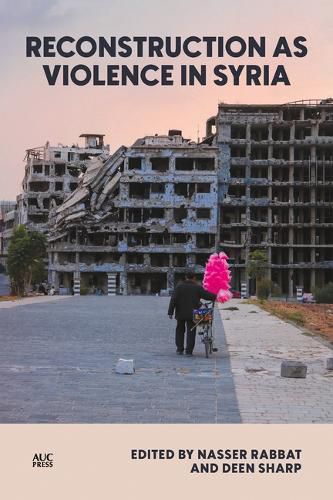Readings Newsletter
Become a Readings Member to make your shopping experience even easier.
Sign in or sign up for free!
You’re not far away from qualifying for FREE standard shipping within Australia
You’ve qualified for FREE standard shipping within Australia
The cart is loading…






A sustained critique of postwar reconstruction in Syria as a politically neutral process
In 2011, emboldened by the Arab Spring, the Syrians rose up against their government. The Syrian regime used violence to suppress the protests, so that what began as pro-democracy protests eventually morphed into a civil war with heavy outside intervention. Today, the Assad regime has fallen, but large parts of the country lie in ruins, millions of Syrians are displaced, and the economy is in freefall. Reconstruction as Violence delves into the complex interplay of post-conflict reconstruction in Syria, challenging the traditionally held dichotomy between the end of violence and the commencement of rebuilding.
The contributors to this volume-architects, urbanists, geographers, and historians-employ critical concepts such as urbicide, domicide, and "civilian crisis architecture" to argue against the conventional theoretical frameworks that support a neat separation of phases. They illustrate how reconstruction often extends the dynamics of conflict into the urban and social realms, suggesting that the built environment becomes a battleground for further violence. They emphasize the importance of acknowledging the historical, economic, societal, legal, and bureaucratic contexts that shape reconstruction efforts, arguing for initiatives that prioritize equity, inclusivity, and community participation.
Reconstruction as Violence starkly underscores the authors' stance that to overlook any of these dimensions, or to disengage from the reconstruction process altogether, represents a political choice with potentially detrimental effects on Syria and beyond in the Arab world, where countries like Palestine, Yemen, Libya, Iraq, Lebanon, and Sudan are undergoing similar cycles of destruction and rebuilding. It calls for a reimagined approach to reconstruction, one that fosters peace, resilience, and social justice in post-conflict societies.
Contributors: Sawsan Abou Zainedin, Madaniya, London, UK Ammar Azzouz, University of Oxford, UK Valerie Clerc, Institut de Recherche pour le Developpement, France Emma Katherine DiNapoli, human rights lawyer, London, UK Omar Ferwati, Goldsmiths, University of London, UK Rim Lababidi, architect and independent scholar, Ohio, USA Wendy Pullan, University of Cambridge, UK Nasser Rabbat, Massachusetts Institute of Technology, Cambridge, MA, USA Hashim Sarkis, Massachusetts Institute of Technology, Cambridge, MA, USA Deen Sharp, London School of Economics, UK Heghnar Watenpaugh, University of California Davis, CA, USA
$9.00 standard shipping within Australia
FREE standard shipping within Australia for orders over $100.00
Express & International shipping calculated at checkout
A sustained critique of postwar reconstruction in Syria as a politically neutral process
In 2011, emboldened by the Arab Spring, the Syrians rose up against their government. The Syrian regime used violence to suppress the protests, so that what began as pro-democracy protests eventually morphed into a civil war with heavy outside intervention. Today, the Assad regime has fallen, but large parts of the country lie in ruins, millions of Syrians are displaced, and the economy is in freefall. Reconstruction as Violence delves into the complex interplay of post-conflict reconstruction in Syria, challenging the traditionally held dichotomy between the end of violence and the commencement of rebuilding.
The contributors to this volume-architects, urbanists, geographers, and historians-employ critical concepts such as urbicide, domicide, and "civilian crisis architecture" to argue against the conventional theoretical frameworks that support a neat separation of phases. They illustrate how reconstruction often extends the dynamics of conflict into the urban and social realms, suggesting that the built environment becomes a battleground for further violence. They emphasize the importance of acknowledging the historical, economic, societal, legal, and bureaucratic contexts that shape reconstruction efforts, arguing for initiatives that prioritize equity, inclusivity, and community participation.
Reconstruction as Violence starkly underscores the authors' stance that to overlook any of these dimensions, or to disengage from the reconstruction process altogether, represents a political choice with potentially detrimental effects on Syria and beyond in the Arab world, where countries like Palestine, Yemen, Libya, Iraq, Lebanon, and Sudan are undergoing similar cycles of destruction and rebuilding. It calls for a reimagined approach to reconstruction, one that fosters peace, resilience, and social justice in post-conflict societies.
Contributors: Sawsan Abou Zainedin, Madaniya, London, UK Ammar Azzouz, University of Oxford, UK Valerie Clerc, Institut de Recherche pour le Developpement, France Emma Katherine DiNapoli, human rights lawyer, London, UK Omar Ferwati, Goldsmiths, University of London, UK Rim Lababidi, architect and independent scholar, Ohio, USA Wendy Pullan, University of Cambridge, UK Nasser Rabbat, Massachusetts Institute of Technology, Cambridge, MA, USA Hashim Sarkis, Massachusetts Institute of Technology, Cambridge, MA, USA Deen Sharp, London School of Economics, UK Heghnar Watenpaugh, University of California Davis, CA, USA